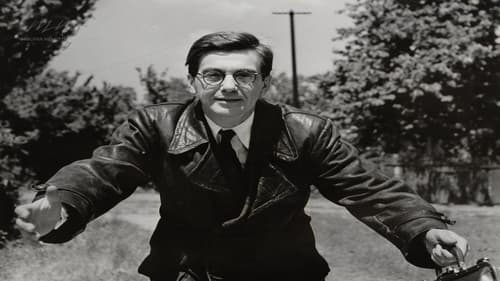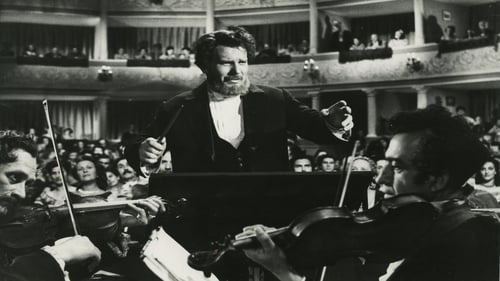
Miklós Gábor
Birth : 1919-04-06, Zalaegerszeg, Hungary
Death : 1998-07-02
History
Miklós Gábor (7 April 1919 – 2 July 1998) was a Hungarian actor, most remembered for his roles in films Valahol Európában and Mágnás Miska. He was husband to Éva Ruttkai, and later Éva Vass.
Miklós Gábor was born 7 April 1919, in Zalaegerszeg. After finishing the Academy of Drama in 1941, he joined the Madách Theatre. From 1945-1954 he was the member of the National Theatre, leaving in 1975 for the Katona József theatre in Kecskemét. From 1979 to 1984, he worked in the Népszínház theatre, after he returned to the National Theatre. In 1991, he joined the Független Színpad theatre. He died on 2 July 1998, in Budapest.
Miklós Gábor is rememberd as a suggestive, reflective actor, a prominent character of the theatrical world emergingin Hungary after 1950. Besides acting, he also directed from 1970. He won the Kossuth Prize in 1953.
Description above from the Wikipedia article Miklós Gábor, licensed under CC-BY-SA, full list of contributors on Wikipedia.

One morning, the caretaker of the student hostel of the University of Horticulture finds Citrom Flóra and Bohus Tamás, by the purest accident, in one bed together. Both are dismissed from university. During the appealing procedures they fall in love with each other.

Igor

The two main characters of this ironic account of the general condition of intellectuals are the charming psychologist, Korin György, and the unexpected. Korin starts a television series of people in their 40s. In the afternoon just after the first section, however, he is reported to be dead as a result of a rather strange accident. Everything turns upside down.

It is a musical comedy about the difficulties of forced education. Kati is scheduled to learn agriculture though she is a lot more interested in maths.

Sinis
Five social misfits undergo cryogenic suspension. When they awake in the far distant future, they find a world devastated by nuclear war. Yet they discover that each of them has some personal involvement - and responsibility - for the series of the events that ended in the destruction of the world they knew.

Molnár Karcsi, the former sport-pilot now sprays fertilizers somewhere in the country and feels that his present job is rather inferior. He is dreaming about limitless heights, but he behaves quite arrogantly with the people around him. He becomes estranged from his wife who waits for him patiently whenever he is away.

Benkõ Béla
The engineer Ambrus has been suspended in his job because he publicly called the attention of the customers to a construction mistake of some goods designed to be exported. His immediate boss learns the news on a business trip to Paris. He meets his old friend Lendvay, an emigrant from Hungary, and his French wife in a cellar bar. After their talk Benkő starts seeing things in a different perspective. When he returns home, he decides to take a stand for Ambrus against Ferenczi, the general director, despite his wife's and the old director's advice.

Apa
The beginning shows Hungary devastated by the war and the postwar reconstruction with its communist government. Our hero (played first by Dániel Erdély and later, as a young man, by András Bálint) is clearly determined to find out what he can about his father who died young. All he knows is that he was a doctor and perhaps he was an honored victim of fascism. He never really finds out but his relationship with his mother, his friends and his Jewish girlfriend will make him totally independent of this need to find all about Apa or Father.

Lantos
13 March 1965 (Hungary)

Flesch fõmérnök
Jancsi is part of a closely knit gang of young engineers. They see the older engineers as mediocre, and have grand ideas about developing new inventions together. With changing living conditions the five friends start to grow apart. At a party Jancsi suddenly meets Éva Halk. They fall in love, and find common memories in the engagement in The Pioneer Railway at the age of 12.

Captain Timar

Fodor, a script-writer of promising talent finds himself in a difficult financial situation. So he comes out with an absurd idea to make a film of. The director, with several scripts having been refused, likes it.

Palotás
Directed by Tamás Fejér

Kelemen
Jirka is a composer, his wife, Jana, a pianist. Jana would like to have an own concert, but so far she has only been selected to accompany Valenta during his concerts in Budapest. After some resentments, she accepts the proposal.

Doctor Hajnal
A Hungarian doctor, Dr. Hajnal, who always considered himself out of politics, falls in love with the Soviet intelligence agent, the radio operator Alba, operating in the occupied Wehrmacht of Hungary. By accident, the radio operator is hiding in the doctor’s house. Hainal is drawn into a life-threatening confrontation with the Germans. A difficult question arises before him: to remain neutral when people die around and Alba is threatened with death, or to remain an honest person — to make his personal choice and take part in this struggle.

Imre Márkus

Major Zoltán Benedek, "Mikádó"
On the eve of World War II, Major Benedek Zoltán is an embodiment of the service regulations in the army. He only discloses his feelings towards Anna, his brother's widow. An investigation is conducted in the regiment to identify Communists.

During the freedom fight led by Rákóczi, Schwartzenau carries the wages of the Emperor's soldiers to Tokaj. A small group of freedom-fighters, led by Captain Árvay, attack the major's escort, then hide in the local inn. Árvay introduces himself to the entering Schartzenau as a Hungarian aristocrat, while Simon Pali rushes to get help. The major has a passion for games, they start throwing dice.

Erdei
In 1944, Feri Margittai escapes from the front, but his mother sends him away from home.

Tibor

Károlyi János
On New Year's Eve in 1956 the artist couple, the actor János and the dancer Viki are hastily packing. While they are waiting for the car, which is to take them across the border, their entire life is replayed in front of their eyes.

Palócz
Sztankó János, the freshly appointed director of a company that builds agricultural factories meets his former classmate, Palócz. Palócz is just released from the prison where he got on made-up charges. Sztankó suddenly decides to employ the engineer since he wants to show up spectacular, quick results.

doktor Málnási
The young worker Tóth Gáspár gets into hospital with stomachache. During the night his state is worsening. The doctor on duty, Málnási does not attend the patient despite the call of the nurse, for he spends the night with nurse Margó.

Pintér Zoltán
At Christmas Eve in 1944 the runaway Pintér and Gozsó get through the Soviet blockade around Budapest. Pintér intends to hide in a flat abandoned by his own relatives, but he finds his relatives called the Turnovszkys, who are hiding the Jewish Jutka as well. Love unfolds between Zoltán and Jutka.

Kocsis Ferenc
Kocsis Ferenc excellent staff appointed the new director of public stores. Ilonka a talented fashion designer, Boriska a dear, Daniel, a overzealous, Klimke, a conservative sale and Glauziusz uncle, conscientious, honest book promotes the work. Ilonka initially rather just keep arguing, even though both of their lives off the job. The selfishness will love soon. Dancs Meanwhile, the old manager spreads the rumor that the new socialist trade can not meet the demand. Relatives and friends start buying into action, leading to mass hysteria. However, the new store is borne by the customer siege until the arrival of the supply.

Béni Egressy

Zsiga Bernáth
Különös házasság is a 1951 Hungarian drama film directed by Márton Keleti. It was entered into the 1951 Cannes Film Festival.

Baranyai
Kis Katalin and Varga Jóska are getting married. During their honeymoon they are preparing plans for the future. Katalin, however, seems to lag behind both in her studies and the work competition, becoming a couch potato version of a wife. Jóska, instead of trying to help, does nothing else than his work.

Miska
Baracs Pista, engineer at the construction site of a railway line near the Korláthy estate, falls in love with Rolla, a countess disguised as a peasant girl. The count is giving a party as he wants the railway line to go across his lands.

Hosszú
1944. A band of runaways and orphans of the war scour the countryside in search of food and shelter. They invade and then taken in by a musician and former concert pianist who’s hiding out in a ruined castle. After the initial altercation between them the gang accepts his guidance and he wins their respect by protecting them from the elements.











